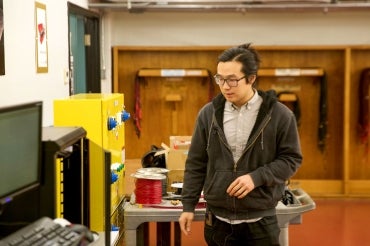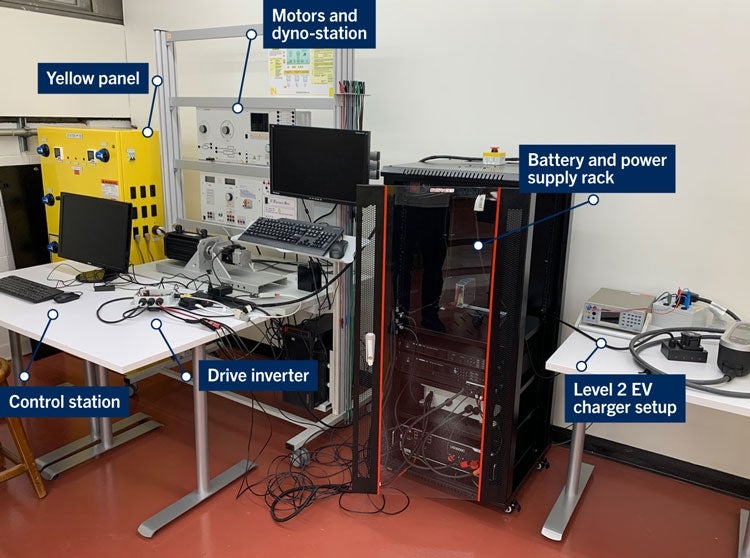EV systems course prepares U of T students for fast-growing field

Sessional lecturer Zhe Gong looks over the components that make up the electric vehicle lab station in the Faculty of Applied Science & Engineering’s Energy Systems Lab (photo by Matthew Tierney)
Published: January 25, 2024
The University of Toronto is offering a graduate course in electric vehicle systems that combines a theoretical background in power and energy flow with hands-on experience.
As demand grows for automotive engineers in the fast-growing electrification field, the multidisciplinary course –offered through the Edward S. Rogers Sr. department of electrical and computer engineering in the Faculty of Applied Science & Engineering – aims to give graduate students a solid understanding of the concepts needed to design high-performance EV systems. It also discusses EV subsystems, with a focus on energy modelling and efficiency.
The new course, launched in fall 2023, comes amid efforts to build Stellantis-LGES and Volkswagen battery plants in Ontario, creating the need for more engineers with EV technology skills.
“The grad course was a pilot to explore how a hands-on EV course could fit into our curriculum,” says alumnus Zhe Gong, the course’s sessional lecturer.
“We’re making sure that we understand the hardware requirements, that we can frame a meaningful scope of experiments and that students can experience sufficient hands-on time through the lab sessions.”
The number of EV models available on the market doubled from 2018 to 2022 to a total of 500, according to the International Energy Agency. And the number of zero-emission vehicles (ZEVs) on the road is slated to increase dramatically in the next decade. Within Canada, this will be spurred in part by the federal government’s emissions reduction plan, which would require ZEVs to comprise all light-duty vehicles sales by 2035.
“Our objective is to prepare our students to be innovation leaders to meet society’s needs,” says Professor Deepa Kundur, chair of the electrical and computer engineering department. “This is especially the case when it comes to sustainability, and a new course offering in electric vehicles helps build a robust talent pipeline to provide the electrification industry with people ready to make a difference.”
Gong says that the lab setup, situated in the department’s undergraduate Energy Systems Lab, took six months to develop and incorporated research from the University of Toronto Electric Vehicle (UTEV) Research Centre into the hardware and software requirements. The setup includes a dynamometer that simulates how the road applies loading force to the vehicle propulsion system, a lithium-ion battery, hardware switches to selectively connect the battery to motor and charger – and a power supply to act as the on-board charger.
EV working components are arranged on lab tables to provide full access, “as if a bench-top electric vehicle,” says Gong.
“We also have something that’s quite unique for an EV lab – EV supply equipment, something you would actually see in a home. We customized the connection between our charger and power distribution panel to allow students to step through the communications interface required for the vehicle to engage the charging sequence.”

“Over the years, a lot of the equipment in the Energy Systems Lab has been designed by profs, research associates, grads, as well as undergrad students,” says Afshin Poraria, director of teaching labs, in reference to the collaborative approach between faculty members, UTEV and undergrad lab managers in creating the lab setup.
“We build whatever we can to feed and expand the student experience. Before long, we’ll likely have undergrad students using this equipment.”
UTEV Director Olivier Trescases, a professor of electrical and computer engineering, says that the “all-hands-on-deck” approach and the creative solutions to equipping the labs are necessary to provide the best possible learning environment for students.
“Over the past few decades, ECE has made major investments to design and deploy custom infrastructure to deliver a unique training experience that is simply not possible with off-the-shelf equipment.”
With three degrees from U of T Engineering, Gong says he’s happy to play a role in the course.
“Through my undergrad days to now, I’ve always known ECE’s labs to be collaborative ones. It’s very exciting for me to be contributing to a new stage, building custom equipment and now teaching the students about electric vehicles – something that I’m passionate about,“ he says. “It’s like coming full circle.”



